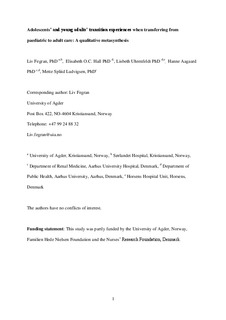Adolescents' and young adults' transition experiences when transferring from paediatric to adult care: A qualitative metasynthesis
Journal article, Peer reviewed

Permanent lenke
http://hdl.handle.net/11250/138725Utgivelsesdato
2013Metadata
Vis full innførselSamlinger
Originalversjon
Fegran, L. i., Hall, E. O. C., Uhrenfeldt, L., Aagaard, H., & Ludvigsen, M. S. (2013). Adolescents' and young adults' transition experiences when transferring from paediatric to adult care: A qualitative metasynthesis. International Journal of Nursing Studies, 1-13. doi: 10.1016/j.ijnurstu.2013.02.001 10.1016/j.ijnurstu.2013.02.001Sammendrag
Objectives: The objective of this study was to synthesize qualitative studies of how adolescents and young adults with chronic diseases experience the transition from paediatric to adult hospital care. Design: The review is designed as a qualitative metasynthesis and is following Sandelowski and Barroso's guidelines for synthesizing qualitative research. Data sources: Literature searches were conducted in the databases PubMed, Ovid, Scopus, Cumulative Index to Nursing and Allied Health Literature (CINAHL), ISI Web of Science, and Nordic and German databases covering the period from 1999 to November 2010. In addition, forward citation snowball searching was conducted in the databases Ovid, CINAHL, ISI Web of Science, Scopus and Google Scholar. Review methods: Of the 1143 records screened, 18 studies were included. Inclusion criteria were qualitative studies in English, German or Nordic languages on adolescents' and young adults' transition experiences when transferring from paediatric to adult care. There was no age limit, provided the focus was on the actual transfer process and participants had a chronic somatic disease. The studies were appraised as suitable for inclusion using a published appraisal tool. Data were analyzed into metasummaries and a metasynthesis according to established guidelines for synthesis of qualitative research. Results: Four themes illustrating experiences of loss of familiar surroundings and relationships combined with insecurity and a feeling of being unprepared for what was ahead were identified: facing changes in significant relationships, moving from a familiar to an unknown ward culture, being prepared for transfer and achieving responsibility. Conclusions: Young adults' transition experiences seem to be comparable across diagnoses. Feelings of not belonging and of being redundant during the transfer process are striking. Health care professionals' appreciation of young adults' need to be acknowledged and valued as competent collaborators in their own transfer is crucial, and may protect them from additional health problems during a vulnerable phase. Further research including participants across various cultures and health care systems is needed.
Beskrivelse
Author's version of an article in the journal: International Journal of Nursing Studies. Also available from the publisher at: http://dx.doi.org/10.1016/j.ijnurstu.2013.02.001